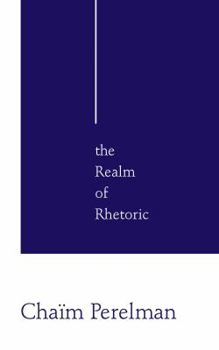The Realm of Rhetoric
Select Format
Select Condition 
Book Overview
The Realm of Rhetoric follows in the tradition of the author's The New Rhetoric, hailed for its wide-ranging and innovative approaches to argumentation. In this new study Chaim Perelman continues to develop his ideas on the theory of rhetoric, now even more cogently and persuasively presented. Pruned of much detail present in the earlier book, this new work captures the essence of his thought in a style and presentation suitable to the...
Format:Paperback
Language:English
ISBN:0268016054
ISBN13:9780268016050
Release Date:September 1982
Publisher:University of Notre Dame Press
Length:206 Pages
Weight:0.35 lbs.
Dimensions:0.6" x 5.4" x 8.1"
Customer Reviews
2 ratings
Rhetoric as Arugmentation
Published by Thriftbooks.com User , 16 years ago
This book serves as a useful introduction to some of the perspectives on rhetoric and argumentation that dominated New Rhetoric from its emergence in the mid-1960s to its demise in the mid-1980s. In many respects it is an abbreviated version of Perelman's foundational, and better known, work THE NEW RHETORIC: A TREATISE ON ARGUMENTATION, co-authored with Olbrechts-Tyteca. Contrary to opinions expressed by other reviewers here, I found the writing clear and easy to read, although the text does assume that readers are well educated in the liberal arts and can recognize references to notable writers and philosophers. And for anyone who hasn't read and understood Plato and Aristotle, the text may be rough sledding. Like most new rhetoricians, Perelman takes an essentially Aristotelian (or perhaps more accurately, Ciceronian) position, which means that there is little innovation in this work. Like Aristotle, he focuses, for example, on the importance of the audience and on shaping one's rhetoric to meet the needs and expectations of that audience. He differs from Aristotle, however, with regard to his understanding of rhetoric. For Aristotle, rhetoric was largely theoretical, as evidenced in his most cogent definition in THE ART OF RHETORIC: the ability of observing or discovering "in each case the existing means of persuasion." Moreover, Aristotle located rhetoric in his broader effort of exploring human nature, whereas Perelman does not. Perelman is significantly more pragmatic: In this text he sees rhetoric as argumentation with the aim of gaining the adherence of an audience. One could argue that this pragmatic orientation was a hallmark of the New Rhetoric, and Perelman's stature ensured that he influenced a generation of new rhetoricians. But one could also argue that this orientation ensured that the movement was doomed from the start, since theory is so much more valued than the pragmatic in academe. On this basis, THE REALM OF RHETORIC is valuable not only as a treatise on rhetoric as argumentation but also as a historical artifact that helps us understand the sudden collapse of New Rhetoric in the face of the postmodern assault.
The "Jackson Pollock" of Rhetoric
Published by Thriftbooks.com User , 17 years ago
To those of us fortunate enough to have had an academic introduction to Perelman, and the rare autodidact who wishes to learn about the discipline, this book is a paragon of modern rhetorical theory. If you're looking for entertainment, this definitely is not for you. Even with a B.A. in Rhetoric from Berkeley, I found Perelman's works a challenge, but the fact remains that he is internationally recognized as one of the most prodigious rhetorical theorists of the 20th century, so if you want to know about rhetoric, you're stuck with him. Rhetoric was the accepted method of Western education until the Dark Ages, which is why Aristotle and his teacher, Plato wrote so much about it. The common modernly understood definition of "rhetoric" (as b.s., for the most part) has absolutely nothing to do with the classically understood meaning. Just as a modern art historian requires a background in classical art history before she can really understand a Jackson Pollock painting, anyone attempting to understand Perelman would benefit by doing so within the context of the history of rhetorical theory. Plato is a great place to start..."The Phaedrus" is an excellent introduction to classical rhetorical theory (that's where they started us at Berkeley). Then one can move on through two-thousand years of constantly evolving theory. Like any discipline, rhetoric requires patience to master.





